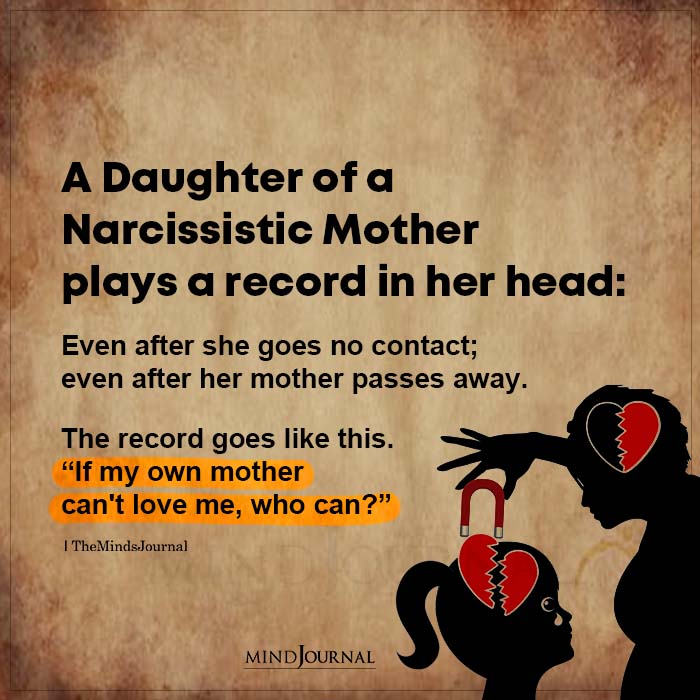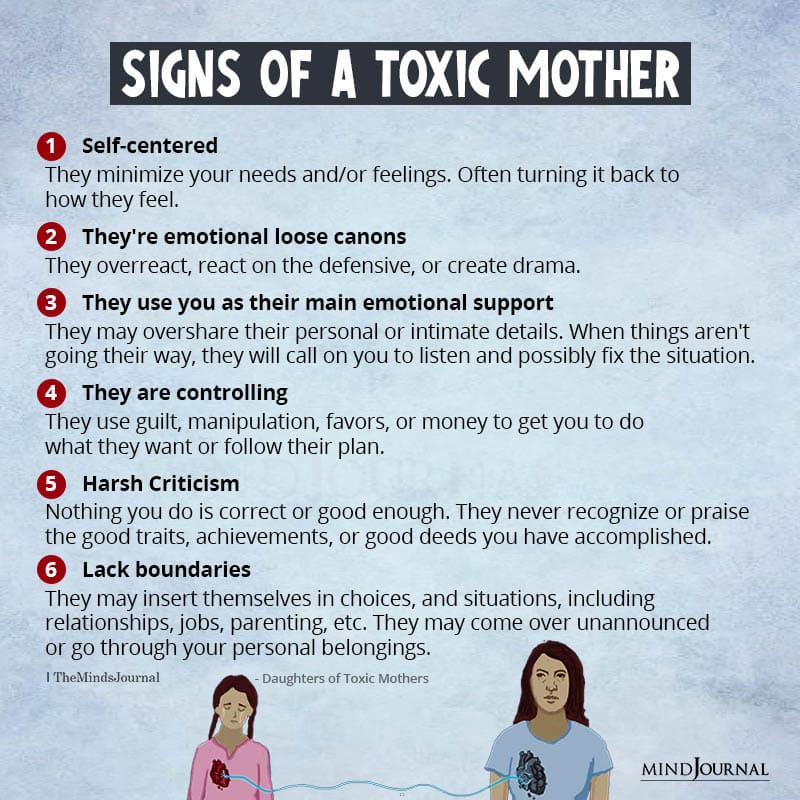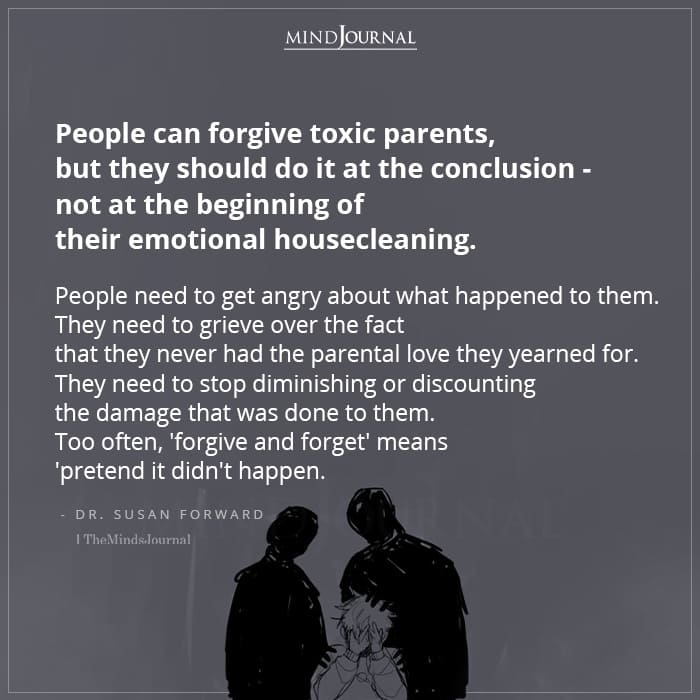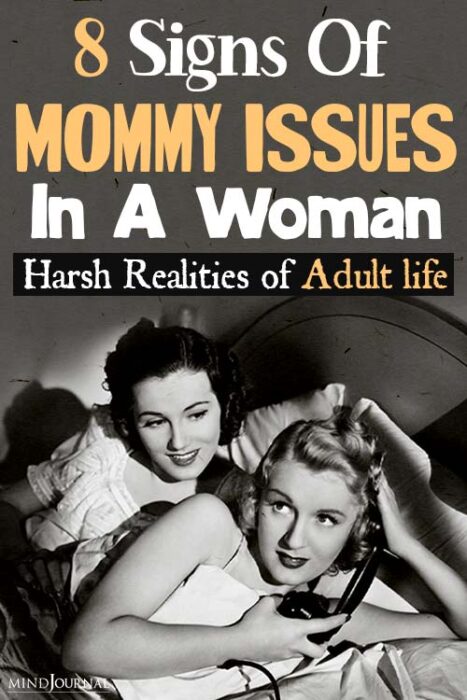We often hear about “daddy issues” in pop culture, but less frequently discussed are “mommy issues”. Just like men, women can have unresolved emotional conflicts stemming from their relationship with their mothers. These signs of mommy issues in a woman, if left unaddressed, can manifest in various aspects of a woman’s life, affecting her relationships, self-worth, and overall mental well-being.
But what are the signs of a woman with mommy issues, and more importantly, what can you do when it comes to dealing with mommy issues? Let’s delve into the intricate world of mommy issues and find a way towards healing.
Before we get started on the signs of mommy issues in a woman, let’s first find out what really is mommy issues in a woman.
Related: 8 Dysfunctional Patterns In Toxic Mother Daughter Relationships And How To Heal From Them
What Are Mommy Issues In A Woman?
Mommy issues in a woman can be thought of as emotional baggage carried from childhood experiences with her mother. When a woman’s relationship with her mom isn’t positive or supportive, it can leave lingering feelings of hurt or confusion.
For example, if her mother was often absent, she might feel abandoned and find it hard to trust others. If her mother was overly strict or controlling, she might either rebel against any form of authority or constantly doubt her own decisions.
In cases where affection was missing, she might always be searching for love and validation, sometimes in unhealthy ways. All these feelings result from those early mother-daughter dynamics, and if not recognized and addressed, they can affect a woman’s adult relationships, self-image, and overall happiness.

8 Signs Of Mommy Issues In A Woman
1. You can be very clingy and over possessive in relationships.
Being overly attached in relationships can signal underlying mommy issues. This behaviour, often seen as clinginess or neediness, stems from unmet emotional needs during childhood. If you didn’t feel securely attached to your mother, you might overly depend on friends, partners, or even colleagues to fill this emotional gap.
Sometimes, even a kind gesture from a stranger might make you latch on. While it’s natural to seek comfort occasionally, constant neediness, especially with those you aren’t close to, suggests deeper unresolved feelings from your bond with your mom.
2. You are caring towards others a bit too much, and can be very over-protective.
A daughter with mommy issues can be a bit too caring sometimes, bordering on overbearing.
Being extremely caring and protective of others can hint at unresolved mommy issues. If your mom constantly hovered over you, you might equate love with self-sacrifice. On the flip side, if she was often absent, you might overcompensate by caring too much for others, trying to “right” her “wrongs”.
This drive pushes you to be the main supporter in your family, either emulating your mother’s actions or filling the void she left. It’s essential to recognize this pattern and balance care for others with self-care. This pattern can also lead to feelings of exhaustion or resentment over time, especially if the care you give isn’t reciprocated.
It’s not uncommon for women with these tendencies to feel unappreciated or overlooked, even though they’re constantly extending themselves for others.
3. You have a difficult and tumultuous relationship with your mother.
A tense relationship with your mother is one of the biggest signs of mommy issues in a woman. But it’s not just about occasional disagreements; it’s about a persistent pattern. Think about your past and present: has most of your time with your mom been tough or stressful?
If the same issues keep resurfacing and, despite your efforts to communicate and mend things, they remain, it points to deeper problems. Recognizing this continuous strain can be a significant step towards understanding and addressing your mommy issues.
Related: 5 Painful Things Daughters Of Unloving Mothers Go Through
4. You hardly have any female friends.
If you are a woman with mommy issues, you might find it easier to bond with men, possibly because you had good relationships with male figures growing up. This can mean having few or no close female friends. Even the female friends you do have might feel more like casual acquaintances than close buddies.
Deep down, you might find it hard to truly connect with other women because of unresolved feelings towards your mom. There’s an underlying fear that other women might treat you the same way your mother did, and this can hinder your friendships from growing stronger.
Understanding this pattern can help you understanding your feelings and working towards forming meaningful relationships with other women.
5. You have a very promiscuous life.
One of the major signs of mommy issues in a woman is this.
If you often engage in casual or risky intimate encounters, it might be a sign you’re trying to fill an emotional gap from your relationship with your mother. Mommy issues in a woman can stem from a range of experiences.
Maybe your mom was overly attentive, leading you to seek intense emotional connections. Or perhaps she was preoccupied with her relationships, leaving you feeling unnoticed. As a result, you might confuse fleeting physical attraction with genuine affection, seeking love in places and ways that don’t truly fulfil your emotional needs. Understanding this behaviour is key to finding healthier ways to seek love and validation.

6. You are petrified of being abandoned by the people you love.
A fear of being left alone can root back to problems with your mom during your early years. If your mom wasn’t always there for you or her love felt uncertain, you might carry a worry that others won’t stick around or love you wholeheartedly. This fear can make you act in ways that aren’t always healthy for your relationships.
For instance, you might become very clingy, always worried in relationships, or even push people away first, thinking it’s better than them leaving you later. This behaviour can lead to a repeating pattern of relationship struggles and feelings of insecurity.
7. You fear that you will become like your mother.
Some women who had challenging relationships with their mothers worry about turning into them, especially if they saw troubling behaviours while growing up. This worry can be really strong, making you avoid anything that even slightly reminds you of your mom’s ways. You might go to great lengths to be different, fearing any similarity.
While it’s natural to want to avoid repeating negative patterns, this intense fear can hold you back in some ways. It’s essential for you to remember that understanding and growth come from acceptance, not just avoidance. Embracing your own identity and understanding your past can help you move forward more confidently.
Related: The 10 Types Of Toxic Mothers: Understanding The Traits That Harm Their Children
8. You have a hard time expressing your love and affection for other people.
Being a daughter with mommy issues, showing affection can be a huge challenge. If your bond with your mother was tricky, you might find it hard to navigate affection. You could either be very touchy-feely with those around you or avoid showing warmth altogether.
Perhaps you weren’t given the best model of balanced affection growing up. This struggle can impact your relationships, as genuine warmth fosters understanding, love, and trust. By not having this balance, your relationships might lack depth and trustworthiness.
Dealing With Mommy Issues: 10 Steps That Can Help You Get Your Peace And Happiness Back
- Acknowledgment: Denial can be a significant roadblock. Accepting that there’s a problem is foundational to recovery.
- Seek therapy: Engaging with a therapist, especially one specializing in familial relations, can offer insights, coping mechanisms, and a safe space to express feelings.
- Open up: Sharing can be therapeutic. Trusted friends or support groups can provide empathy, understanding, and alternative perspectives.
- Set boundaries: Establishing emotional and physical boundaries can protect from further harm while allowing space for healing.
- Self-love rituals: From mindfulness practices to self-care routines, cultivating self-love can rebuild the eroded sense of self-worth.
- Journaling: Chronicling thoughts and feelings can bring clarity, and over time, patterns might emerge that offer deeper understanding.
- Seek positive female role models: Engaging with uplifting and supportive female figures can help rewrite the internal narrative about women.
- Educate yourself: Books, seminars, or workshops on mother-daughter dynamics can provide valuable insights.
- Join support groups: A community of people with similar experiences can offer camaraderie, strategies for coping, and a sense of belonging.
- Practice forgiveness: This doesn’t mean condoning hurtful behaviours but finding a place of understanding and letting go for personal peace.

Bottomline
Signs of mommy issues in a woman, though less frequently discussed, are very real and can have profound effects on a woman’s life. Recognizing the signs of a woman with mommy issues is crucial, but taking steps towards healing is even more vital.
Remember, it’s never too late to seek help, mend relationships, or simply choose a path of self-love and forgiveness.
Remember, you are not defined by your past or your relationship with your mother. You have the power to create your own narrative and rewrite the script of your life. Embrace self-compassion, cultivate self-love, and surround yourself with a supportive network of individuals who believe in your ability to heal and grow.
Every woman deserves to lead a life filled with love, understanding, and peace.
Related: The Good Daughter Syndrome: 7 Signs of Narcissistic Mother Empath Daughter Dynamics
Have you ever encountered signs of mommy issues in a woman? Let us know your thoughts in the comments down below!









Leave a Reply
You must be logged in to post a comment.